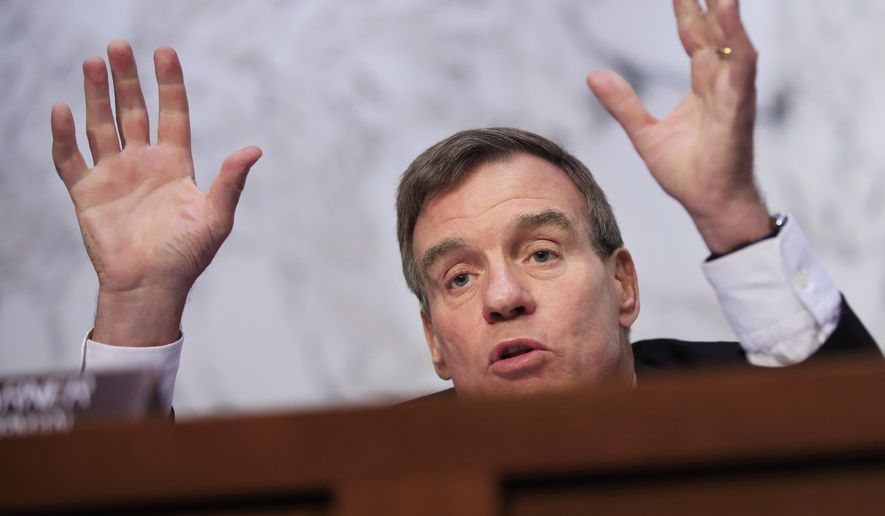The vice chair of the Senate Intelligence Committee pressed Friday for adopting a “whole-of-society” cyber doctrine to counter ongoing attacks waged by foreign adversaries, calling it “one of the most urgent challenges of our time.”
Sen. Mark Warner, Virginia Democrat, made the plea during an event held at the Center for a New American Security in D.C., while laying blame across the federal government for the absence of an existing “clear and thoughtful” U.S. cyber doctrine.
“Countries like Russia are increasingly merging traditional cyberattacks with information operations. This emerging brand of hybrid cyberwarfare exploits our greatest strengths — our openness and free flow of ideas. And unfortunately, we are just now waking up to that fact,” Mr. Warner said.
The federal government “is still not sufficiently organized or resourced to tackle this hybrid threat,” Mr. Warned cautioned, notwithstanding a “flurry of strategy documents” issued by the White House and Department of Defense.
“We have no White House cyber czar, no cyber bureau or senior cyber coordinator at the State Department, and we still have insufficient capacity at both State and [U.S. Department of Homeland Security] when it comes to both,” Mr. Warner said. “The State Department, which should lead U.S. engagement with the world on cyber, remains weak in addressing this threat.
“Let me be clear,” he added. “Congress … does not have its act together, either.”
Citing cybersecurity risks posed by factors ranging from state-sponsored hackers to Americans’ increased dependence on the internet, Mr. Warner laid out several recommendations during his keynote address meant to defend against foreign adversaries attacking domestic targets.
“If we’re going to turn this around, we need not just a whole-of-government approach, but we need a whole-of-society cyber doctrine,” he said. “It’s not enough to simply improve the security of our infrastructure, computer systems and data. We must also deal with adversaries who are using American technologies to exploit our freedom, our openness and basically attacked our most important asset: our democracy.”
Mr. Warner’s proposed cyber doctrine includes developing new rules and norms governing the use of cyber and information operations; adopting a society-wide effort to combat misinformation and disinformation; hardening the security of the nation’s computer networks and realigning defense spending priorities.
“The final point is that we desperately need strong federal and presidential leadership for any U.S. digital doctrine to be truly effective,” he said. “Because this challenge literally touches every aspect of our society, we need presidential leadership and a senior coordinating official to head the inner-agency process on this issue.”
A former governor of Virginia, Mr. Warner was among a group of more than a dozen Democrats who signed a letter in May opposing the White House’s decision to eliminate the job of cybersecurity coordinator, the White House’s top cyber policy position.
“Our country’s cybersecurity should be a top priority; therefore, it is critically important that the U.S. government present a unified front in defending against cyberattacks,” the Democrats wrote.
The National Security Council eliminated the advisory job four days after outgoing cybersecurity coordinator Rob Joyce left in May, labeling the move an effort to “streamline authority.”
The White House did not immediately return a request for comment.
Russian state-sponsored hackers compromised U.S. computer systems in 2016 during a multipronged interfere campaign that also included spreading disinformation and propaganda across social media platforms, U.S. officials have concluded. Moscow has adamantly denied responsibility.
• Andrew Blake can be reached at ablake@washingtontimes.com.




Please read our comment policy before commenting.